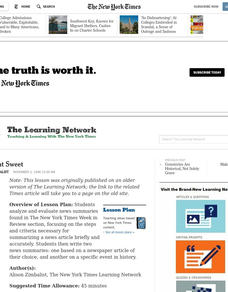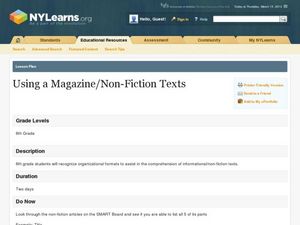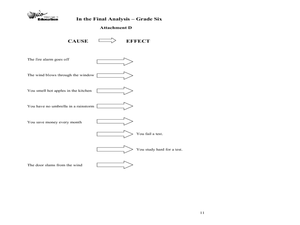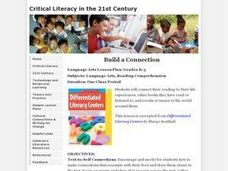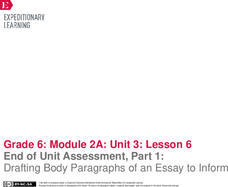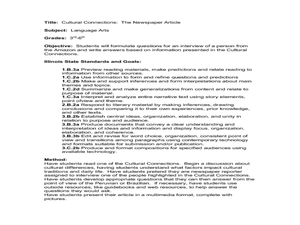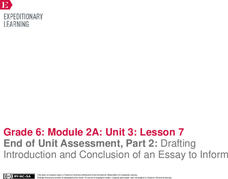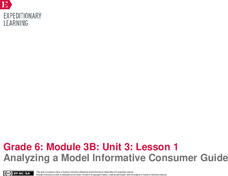National Math + Science Initative
Reading an Informational Text: "It All Started with Sputnik"
Sputnik was one of the greatest scientific advancements of the 1950s, and this reading lesson does it justice. Pupils start off with pre-reading questions and a video. They then read an excerpt from an article, which is accompanied by...
Curated OER
Press Review
How can word choice affect a political speech? Middle and high schoolers examine the text of the 1999 State of the Union Address, and then determine how newspaper articles and television reports describe and analyze the event. Use this...
Curated OER
Short But Sweet
After analyzing and evaluating news summaries found in the New York Times "Week in Review" section, middle schoolers study the steps for summarizing a news article briefly and accurately. They write two news summaries: one on a newspaper...
Fluence Learning
Writing About Informational Text: Music and the Brain
Even if you've never picked up a musical instrument, chances are that music has directly impacted your mental and emotional development. Sixth graders engage in a reading activity in which they read two articles on the impact of music on...
Curated OER
Search Warranted?
Young readers work on evaluating claims in a piece of informational text with the article "In New York, It's Open Bag or Find Exits" from the New York Times. They analyze current search procedures implemented to fight terrorism and...
Curated OER
Using a Magazine/Non-Fiction Texts
Working with magazine articles and other informational texts, learners identify the parts of a non-fiction work. The learners use SMART board files to guide instruction, as well as a transition to writing their own non-fiction article in...
Curated OER
The Final Analysis: Cause and Effect, Fact and Opinion
Middle schoolers read and review informational texts, analyze cause and effect, and distinguish fact from opinion. They assess a "one-minute mystery" you read aloud for cause and effect relationships. Resource includes complete set of...
Curated OER
A Better Class of Journal-ists
Young academics create a current events journal by skimming newspapers for articles that fit defined guidelines for informational texts. After cutting out two articles each week to add to their journals, they write a brief description of...
Read Works
Signal Words in Expository Text
Signal words are one way that authors make the relationships between their ideas clear. Allow your learners the chance to investigate cause and effect in texts by identifying signal words. They locate and analyze cause-and-effect...
Curated OER
Build a Connection
Learners discuss their personal connections with stories they've read in the past and identify techniques to connect with more stories. They create illustrations, construct task cards, and complete sentence stems based on books they read...
Curated OER
Strong Convictions
How can the rhetorical structure of an editorial help to develop its argument? Use this New York Times editorial to emphasize the importance of structure in a piece of informational text. Adolescent writers then use the editorial as a...
EngageNY
Research Tasks: New Words, Relevant Information, Revision
Word builders. Scholars participate in a mini instructional activity about affixes. They then complete a research vocabulary organizer and share their definitions of the words with the class. They gather more evidence for their research...
EngageNY
End of Unit Assessment: Drafting the Informative Consumer Guide
Not all sandwiches are edible. Scholars use a Quote Sandwich graphic organizer to draft the written content of their informative consumer guides. Additionally, they view a mini-lesson plan on formal writing.
EngageNY
Researching Information about Sustainable Fishing
Go fish! Scholars continue using their research skills to find factual information to use in their consumer brochures about overfishing. They work in triads to research information about sustainable fishing practices and share their...
EngageNY
Analyzing the Features of an Informative Consumer Guide
Analyze, strategize, synthesize! Scholars analyze informative consumer guides to determine what features to include in their own guides. Next, pupils select charts and images to use in their guides.
EngageNY
Mid-Unit 3 Assessment Part 1: Researching Information about Buying Fish Caught Using Sustainable Methods
Sustainable seafood is not an oxymoron. Pupils watch a video about how consumers purchase seafood responsibly. Then, using resources in their assessment research folders, they complete a graphic organizer to record factual information...
EngageNY
End of Unit Assessment, Part 1: Drafting Body Paragraphs of an Essay to Inform
Anybody can write a body paragraph! Pupils analyze the development of ideas in a body paragraph from a model essay. Next, using what they've learned, they draft the body paragraphs of their My Rule to Live By informative essay.
Curated OER
The Newspaper Article
Have your class participate in an interview activity using an informational text about the Amazon. After reading a Cultural Connections story about a person from the Amazon, middle schoolers write interview questions based on the text....
Curated OER
Is That a Fact?
Investigate popular scientific claims and gather evidence to defend or argue against an author's stance. Writers synthesize information and compose their own "Really?" columns modeled after those found in the weekly "Science Times"...
EngageNY
End of Unit Assessment, Part 2: Drafting Introduction and Conclusion of an Essay to Inform
A powerful introduction and conclusion can really pack a punch. Using the resource, scholars first read and discuss a model essay. Then, as part of the end of unit assessment, they draft the introductory and concluding paragraphs of...
EngageNY
Analyzing the Structure and Content of an Essay to Inform
Outlines are a great asset to essay planning. Scholars read and analyze a model essay about the importance of daily reading and consider how it would look in an outline format. Next, they outline their own informative essays about rules...
EngageNY
Analyzing a Model Informative Consumer Guide
What do consumers need to know about overfishing before buying fish? Scholars consider the question as they prepare for their performance task, which is to create a consumer guide for people about purchasing fish responsibly. After...
Curated OER
Informative Writing for the Winter Season
Informational writing lessons can be creative and motivating for students.
Curated OER
Does Mother Nature Know Best?
Investigate herbal medicine in the science or health classroom with this instructional activity from the New York Times. After a discussion about class members beliefs about and experiences with herbal medicines, pupils read an article...




